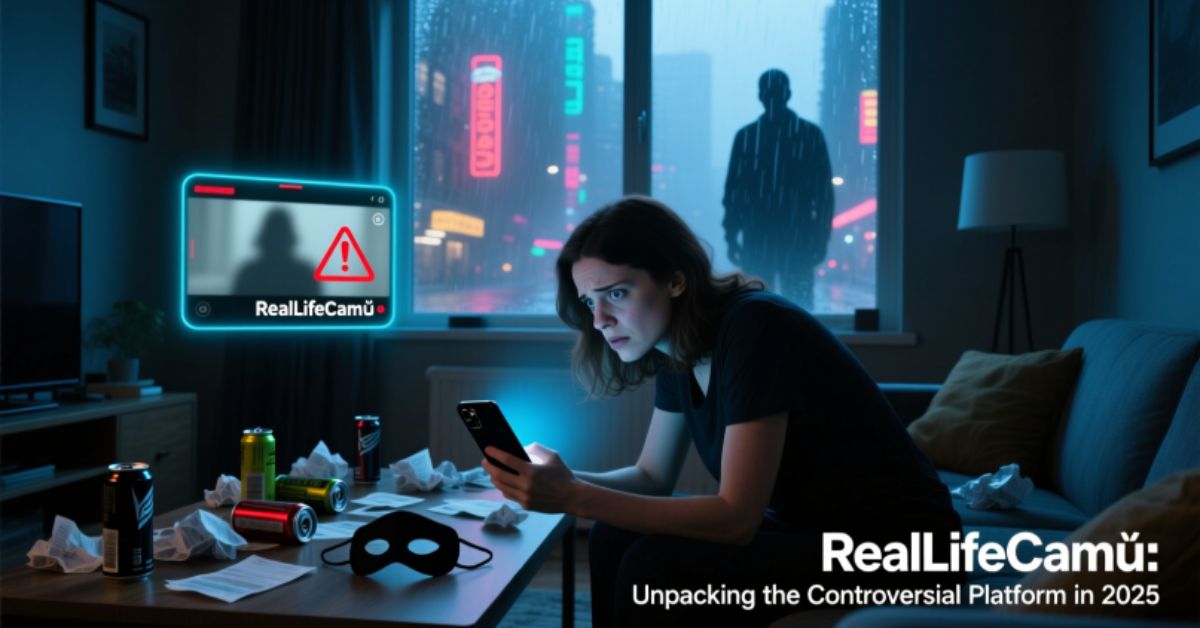The term RealLifeCamù often appears in searches related to live streaming, surveillance, and adult entertainment, sparking significant debate and concern. This platform operates on a premise that captures real-time, unfiltered footage from cameras placed in private spaces, presenting it to a paying audience. As we examine this phenomenon in 2025, it is crucial to approach the topic with a clear understanding of its operational model, the technology involved, and the profound ethical and legal questions it raises. This article will provide a detailed look into RealLifeCamù, explaining its features, the serious risks involved for all parties, and the broader implications of its existence in a digitally connected world.
What is RealLifeCamù?
RealLifeCamù is a subscription-based website that provides users with access to live video feeds from cameras installed in private residences around the world. The platform markets itself as offering an unfiltered, voyeuristic look into the everyday lives of individuals and families. The core concept involves participants who agree to have their homes equipped with cameras in exchange for financial compensation or free housing. These cameras stream continuously, 24/7, capturing everything from mundane daily routines to intensely private and intimate moments.
The content is presented without editing, which is a key part of its appeal to subscribers. Users can switch between different cameras located in various rooms and households. This model blurs the lines between reality television, surveillance, and adult content, creating a unique and highly controversial niche in the online entertainment landscape. The platform’s operation hinges on the consent of the primary participants, but the ethical complexities extend far beyond a simple agreement.
Features and Platform Usability
The platform’s design is focused on providing a seamless voyeuristic experience. Understanding its features is key to grasping its appeal to its user base and the controversies it generates.
- Live, 24/7 Streaming: The main feature is the continuous, around-the-clock broadcasting from multiple households. There are no scripts, no production staff, and no edits, which is sold as a “truly real” experience.
- Multi-Camera Access: Subscribers can typically access feeds from numerous cameras within a single residence, covering living rooms, kitchens, bedrooms, and bathrooms. This gives viewers the ability to follow participants throughout their daily lives.
- Global Reach: The platform features households from various countries, offering a glimpse into different cultures and lifestyles, though this is secondary to the voyeuristic intent.
- Archived Footage: In addition to live streams, the service often provides an archive of previously recorded moments, allowing users to catch up on events they may have missed.
- Anonymized Participants: The individuals and families on camera are usually presented with pseudonyms or generic labels to maintain a degree of anonymity, though the visual exposure itself makes true privacy impossible.
The usability is straightforward: users log in, select a household or camera, and begin watching. This simplicity masks the complex and troubling reality of what is being broadcast.
The Significant Risks and Ethical Concerns
The operation of RealLifeCamù is fraught with severe risks and ethical problems that warrant careful consideration. These issues affect not only the participants but also the viewers and society at large.
Pros (from the platform’s perspective):
- Financial Incentive for Participants: The primary “pro” for those who agree to be filmed is financial compensation, which can be a powerful motivator for individuals in precarious financial situations.
- Niche Entertainment: For its subscribers, the platform offers a unique form of voyeuristic entertainment that is not available through mainstream media.
Cons and Overwhelming Risks:
- Extreme Invasion of Privacy: The most obvious risk is the total loss of privacy for participants. Every moment, no matter how personal, is subject to being watched and recorded by an unknown number of anonymous viewers.
- The Issue of Consent: While primary participants may consent, this consent is ethically dubious. It is often impossible for them to fully grasp the long-term consequences of having their entire lives broadcast. More critically, guests, friends, visiting family members, and especially children who enter these homes cannot provide meaningful consent to be filmed and broadcast globally.
- Potential for Exploitation: The model preys on financial vulnerability. Individuals may feel pressured to agree to terms they are not comfortable with due to economic hardship. This power imbalance makes the concept of “free and informed consent” highly questionable.
- Security and Data Dangers: The footage is a valuable target for hackers. A data breach could lead to the unauthorized distribution of extremely sensitive videos, which could then be used for blackmail, harassment, or posted on other sites without context or consent, lasting forever online.
- Psychological Harm: Living under constant surveillance can have severe long-term psychological effects, including paranoia, anxiety, and depression. Participants may alter their behavior, leading to a loss of authenticity and personal identity.
Evaluating RealLifeCamù with Google’s E-E-A-T Framework
Applying Google’s E-E-A-T (Experience, Expertise, Authoritativeness, Trustworthiness) framework reveals the platform’s problematic nature.
- Experience: The platform provides direct, unfiltered “experience,” but it is the experience of surveillance. Content about the platform must highlight the lived experience of those who have participated, often reported as negative in the long run.
- Expertise: The operators possess expertise in video streaming technology and online subscription models. However, they lack demonstrated expertise or concern for ethical conduct, digital rights, and the psychological well-being of their participants.
- Authoritativeness: The platform is an authority only within its own dark niche. It holds no positive authoritativeness in the broader contexts of technology, media, or entertainment due to its controversial methods.
- Trustworthiness: This is where the model completely fails. The platform is fundamentally untrustworthy. The inherent risks to privacy, the questionable nature of consent, and the potential for exploitation make it impossible to be considered a trustworthy entity. Any content discussing RealLifeCamù must emphasize these deep-seated trust issues.
Legal Landscape and Societal Impact
The legality of RealLifeCamù exists in a gray area. In many jurisdictions, filming within one’s own home is legal. If the primary resident consents, they are technically allowed to do so. However, laws regarding the recording of other individuals without their consent (like guests) vary dramatically by location and often require at least one-party consent, which is still ethically murky in this context.
The societal impact is chilling. The normalization of such extreme surveillance for entertainment can erode the expectation of privacy for everyone. It commodifies private life in a way that is dehumanizing and sets a dangerous precedent for what is considered acceptable in the name of content and profit.
Conclusion
RealLifeCamù represents a controversial intersection of technology, entertainment, and human privacy. While it operates on a model of consent from its primary participants, the ethical framework is deeply flawed, presenting significant risks of exploitation, psychological harm, and irreversible privacy loss, especially for third parties. The platform’s features are designed for consumption by a voyeuristic audience, but the cost is paid by the individuals whose lives are turned into 24/7 content. As we navigate 2025, it is imperative for users, creators, and regulators to critically question the ethical boundaries of online content. Platforms built on such a foundation of compromised privacy and questionable consent should be viewed with extreme caution.
Promoting digital literacy and advocating for stronger privacy protections are essential steps in ensuring that technology serves humanity, rather than exploiting it.
FAQs
1. Is RealLifeCamù legal?
The legality is complex and exists in a gray area, depending on local laws regarding consent and the recording of individuals in private spaces.
2. How do participants get involved with RealLifeCamù?
Participants typically agree to have cameras installed in their homes in exchange for money or free rent, often applying through the platform’s website.
3. Are the people on RealLifeCamù aware they are being filmed?
The primary residents who sign the contract are aware, but the critical ethical issue involves guests or family members who may not be.
4. What are the biggest risks of using or participating in such platforms?
The biggest risks include a complete loss of privacy, the potential for exploitation, psychological harm, and the permanent distribution of your private life online.
5. Are there alternatives to RealLifeCamù?
For entertainment, there are countless ethical streaming services and content platforms that do not rely on invading the privacy of non-consenting individuals.












